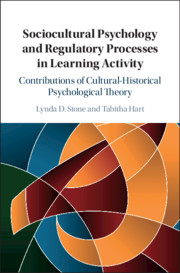 Sociocultural Psychology and Regulatory Processes in Learning Activity
Sociocultural Psychology and Regulatory Processes in Learning Activity Book contents
- Sociocultural Psychology and Regulatory Processes in Learning Activity
- Sociocultural Psychology and Regulatory Processes in Learning Activity
- Copyright page
- Dedication
- Contents
- Figures
- Transcription Excerpts
- Foreword
- Acknowledgments
- Transcription Conventions
- Introduction
- Chapter 1 Cultural-Historical Psychological Theory
- Chapter 2 The Relational Habitus and Regulatory Processes
- Chapter 3 Practical-Moral Knowledge and Regulatory Processes
- Chapter 4 Identity and Competence Woven Together Through Regulatory Processes
- Chapter 5 Contextual Mood and Regulatory Processes
- Conclusion
- References
- Index
Conclusion
Published online by Cambridge University Press: 30 September 2019
- Sociocultural Psychology and Regulatory Processes in Learning Activity
- Sociocultural Psychology and Regulatory Processes in Learning Activity
- Copyright page
- Dedication
- Contents
- Figures
- Transcription Excerpts
- Foreword
- Acknowledgments
- Transcription Conventions
- Introduction
- Chapter 1 Cultural-Historical Psychological Theory
- Chapter 2 The Relational Habitus and Regulatory Processes
- Chapter 3 Practical-Moral Knowledge and Regulatory Processes
- Chapter 4 Identity and Competence Woven Together Through Regulatory Processes
- Chapter 5 Contextual Mood and Regulatory Processes
- Conclusion
- References
- Index
Summary
The Conclusion provides an overview of our theoretical approach and details how each of the four novel sociocultural lenses presented in this book offers observational and analytical tools for better understanding how behavioral regulation is a competency that is socially embedded and functions as a system of self-, other-, co-, and socially shared regulatory processes. Reconceptualizing competence as involving all forms of behavioral regulation moves away from the dualisms characteristic of traditional psychological approaches that divide the self from culture and the individual from society. Our analytical lenses do not reject the importance of an individual’s development of psychological and practical actions over time, but rather reframe them as part of a relational process of agency in which the regulated actions and interactions used to enact and develop intellectual and social emotional competences are always part of the sociocultural world.
- Type
- Chapter
- Information
- Sociocultural Psychology and Regulatory Processes in Learning ActivityContributions of Cultural-Historical Psychological Theory, pp. 107 - 113Publisher: Cambridge University PressPrint publication year: 2019


